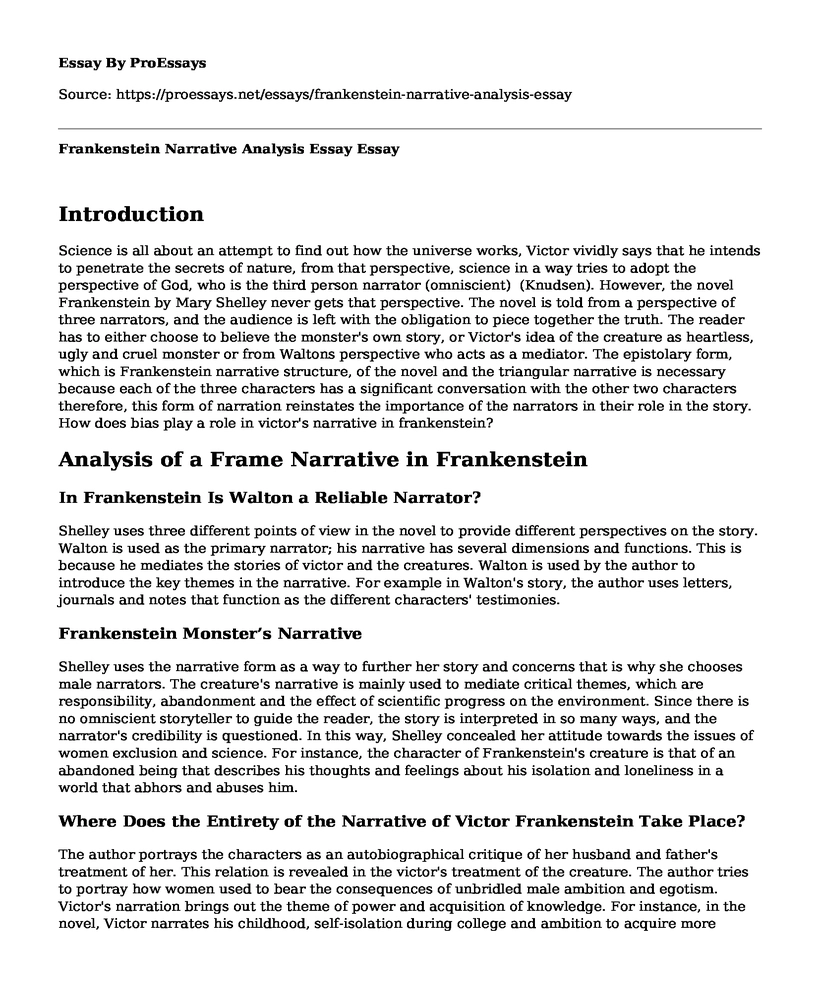Introduction
Science is all about an attempt to find out how the universe works, Victor vividly says that he intends to penetrate the secrets of nature, from that perspective, science in a way tries to adopt the perspective of God, who is the third person narrator (omniscient) (Knudsen). However, the novel Frankenstein by Mary Shelley never gets that perspective. The novel is told from a perspective of three narrators, and the audience is left with the obligation to piece together the truth. The reader has to either choose to believe the monster's own story, or Victor's idea of the creature as heartless, ugly and cruel monster or from Waltons perspective who acts as a mediator. The epistolary form, which is Frankenstein narrative structure, of the novel and the triangular narrative is necessary because each of the three characters has a significant conversation with the other two characters therefore, this form of narration reinstates the importance of the narrators in their role in the story. How does bias play a role in victor's narrative in frankenstein?
Analysis of a Frame Narrative in Frankenstein
In Frankenstein Is Walton a Reliable Narrator?
Shelley uses three different points of view in the novel to provide different perspectives on the story. Walton is used as the primary narrator; his narrative has several dimensions and functions. This is because he mediates the stories of victor and the creatures. Walton is used by the author to introduce the key themes in the narrative. For example in Walton's story, the author uses letters, journals and notes that function as the different characters' testimonies.
Frankenstein Monster’s Narrative
Shelley uses the narrative form as a way to further her story and concerns that is why she chooses male narrators. The creature's narrative is mainly used to mediate critical themes, which are responsibility, abandonment and the effect of scientific progress on the environment. Since there is no omniscient storyteller to guide the reader, the story is interpreted in so many ways, and the narrator's credibility is questioned. In this way, Shelley concealed her attitude towards the issues of women exclusion and science. For instance, the character of Frankenstein's creature is that of an abandoned being that describes his thoughts and feelings about his isolation and loneliness in a world that abhors and abuses him.
Where Does the Entirety of the Narrative of Victor Frankenstein Take Place?
The author portrays the characters as an autobiographical critique of her husband and father's treatment of her. This relation is revealed in the victor's treatment of the creature. The author tries to portray how women used to bear the consequences of unbridled male ambition and egotism. Victor's narration brings out the theme of power and acquisition of knowledge. For instance, in the novel, Victor narrates his childhood, self-isolation during college and ambition to acquire more knowledge. In doing so, the victor is putting himself and the people he loves in danger.
Conclusion
Shelley's use of three narrative voices of Frankenstein creates echoes of ghost stories as the attention is drawn to the storyteller rather than to the story itself. Therefore the reader becomes more aware of the changes in the perspectives and therefore actively involves themselves in the interpretation of the narrative of Frankenstein. The use of Walton as the final voice also affords the creature a chance to be perceived as more human than his master. Shelley gives neither Victor nor the creature power over the other by using Walton as the first and last narrator. In this way, she provides the reader with an opportunity to understand and interpret the story from various perspectives.
Reference
Knudsen, Othello Louise. "Reading Between the Lines: An analysis of Mary Shelley's Frankenstein, or, the Modern Prometheus." Frankenstein Thesis (2012): 28-36.
Cite this page
Frankenstein Narrative Analysis Essay. (2021, Dec 20). Retrieved from https://proessays.net/essays/frankenstein-narrative-analysis-essay
If you are the original author of this essay and no longer wish to have it published on the ProEssays website, please click below to request its removal:
- Critical Essay on Pride and Prejudice
- Tessie Hutchinson in The Lottery Essay
- Quotes Analysis: Silhouette by Langston Hughes
- Literary Analysis Essay on Similarities Between Brain on Fire and Ten Days in a Madhouse
- Leadership in Antigone - Essay Sample
- Paper Example on John Conrad: From Congo to Victorian Scholar
- Gothic Elements in Faulkner's "A Rose for Emily" - Essay Sample







